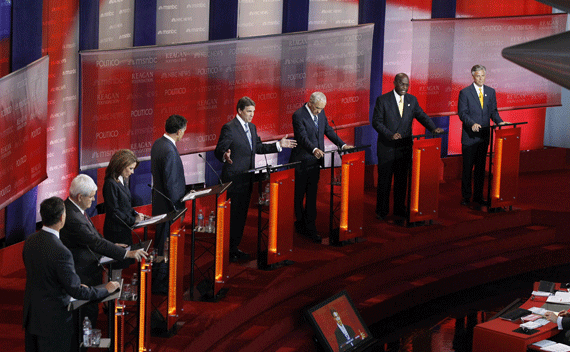Four Takeaways from the GOP Presidential Debate
More on:

Sunday marks the tenth anniversary of 9/11, but last night’s GOP presidential debate barely discussed America’s role in the world. Debate moderators Brian Williams and John Harris apparently took to heart the Gallup polls showing that fewer than one in ten Americans name any foreign policy issue as the most important problem facing the country.
So with a minimal amount of material to work with, here are four takeaways about what the candidates said about foreign policy:
1. Candidates can mangle the facts. Debates typically feature claims that are flat wrong, and last night’s debate was no exception. Michele Bachmann repeated something she has said before, namely, that President Obama is insisting that Israelis must “shrink back to their indefensible 1967 borders.” What Obama actually said was that “the borders of Israel and Palestine should be based on the 1967 lines, with mutually agreed swaps so that secure and recognized borders are established for both states.” The qualifier “with mutually agreed swaps” makes all difference. Rick Santorum believes that Obama “only went along with the Libyan mission because the United Nations told him to.” Ah, no. The Obama administration pushed for UN Security Council Resolution 1973; it didn’t sit around waiting for orders from Turtle Bay.
2. Rick Perry needs to figure out what he means by “military adventurism.” Perry vowed at last week’s VFW national convention to avoid a “foreign policy of military adventurism.” That raised an obvious question: what constitutes “military adventurism”? Harris asked Perry to explain, and the Texas governor didn’t have an answer. He responded at first by saying that he “was making a comment about a philosophy”—without explaining what that philosophy was—and then pivoting to applaud the killing of Osama bin Laden. When Harris pressed him to explain his philosophy, Perry offered empty bromides about having “a clear exit strategy” and never putting “our young men and women’s lives at risk when American interests are not clearly defined.” Perry can expect to hear more questions about military adventurism, perhaps as soon as Monday night’s debate in Tampa.
3. Michele Bachmann isn’t backing down on Libya. Bachmann said from the start that Operation Odyssey Dawn was a bad idea, and the fall of Tripoli hasn’t changed her mind. When Harris pushed her about Qaddafi’s ouster, she was crystal clear: the United States has no vital interest in Libya, and “if there is no vital interest, that doesn’t even meet the threshold of the first test for military involvement.” If only all debate answers responded so directly to the question asked.
4. Rick Santorum thinks his rivals are embracing isolationism. The former Pennsylvania senator specifically singled out Jon Huntsman and Ron Paul for embracing “a very isolationist view of where the Republican Party should be headed” because they want to bring U.S. troops home from Afghanistan. (Why withdrawing U.S. troops from a ten-year-old war constitutes isolationism is a separate question.) Santorum’s endorsement of the Libyan mission and his criticism of exit strategies suggests he thinks that Bachmann and Perry are also drinking from the isolationist well. But Santorum’s comments drew almost no applause even though he called on Republicans “to stand in the Reagan tradition” of spreading American values around the world. Republican voters, even ones in the audience at the Ronald Reagan Presidential Library, just aren’t eager for foreign policy activism.
What are your takeaways on foreign policy from the debate?
More on:
 Online Store
Online Store